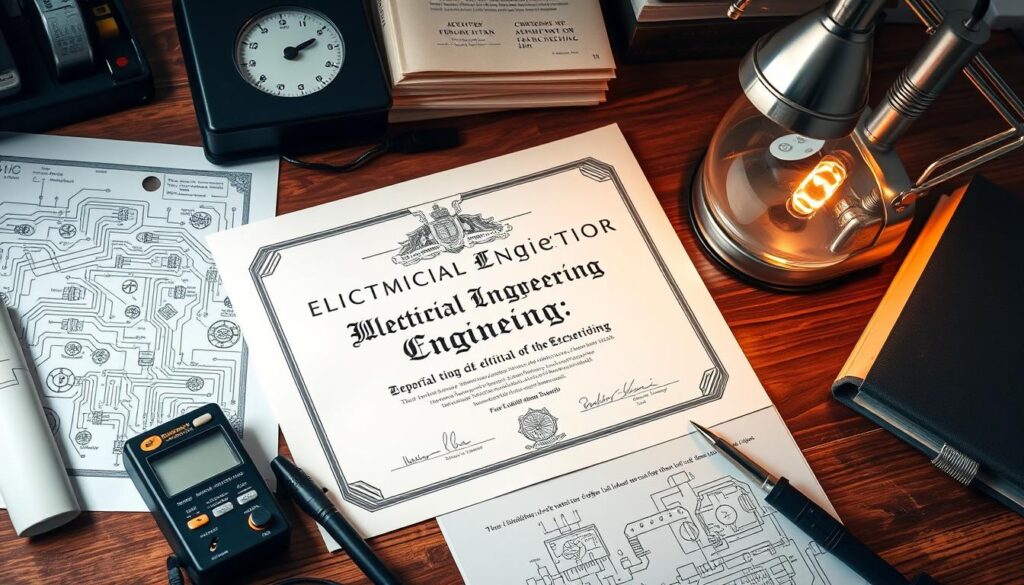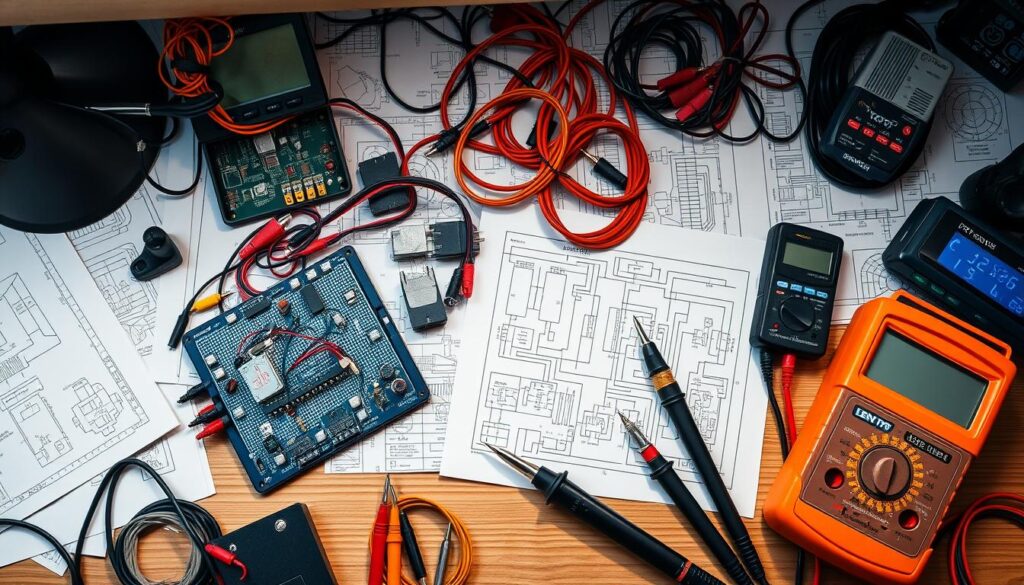The field of electrical engineering is booming today. It needs skilled electrical engineers to keep and improve electronic devices. The iLearn Engineering Diploma in Electrical and Electronic Engineering is a 40 credit course. It’s split into two units, each worth 20 credits, giving students a solid start in electrical engineering.
This diploma covers many topics like electrical circuits, electronics, and power systems. It prepares students for many jobs in the field. With more jobs opening up, this diploma is a great way to start a fulfilling career in electrical engineering.

After finishing the program, graduates can work in many areas. This includes manufacturing, construction, transportation, and government jobs. They can also move up by using their credits for a Higher International Certificate or Diploma in Electrical and Electronic Engineering.
Key Takeaways
- The iLearn Engineering Diploma in Electrical and Electronic Engineering is a 40 credit course.
- The program is divided into two units, each worth 20 credits.
- Graduates can pursue careers in various sectors such as manufacturing, construction, transportation, and government organizations.
- The diploma program provides a gateway to a dynamic and rewarding technical career in electrical engineering.
- Options for progression include transferring credits towards a Higher International Certificate or a Higher International Diploma in Electrical and Electronic Engineering.
- The program covers a wide range of topics, including electrical circuits, electronics, and power systems.
Understanding the Diploma in Electrical Engineering Program
The Diploma in Electrical Engineering program is a detailed course. It gives students a full grasp of the field. To start, students need a high school diploma or similar. The program’s length and setup can change based on the school.
It usually mixes theory and hands-on learning. A diploma program in electrical engineering opens doors to many career prospects. Students can become Electrical Engineers, Power Systems Engineers, or Control Systems Engineers.
The program covers various settings, from homes to farms. Key subjects include:
- Electrical Installation Technology
- Analogue Electronics
- Digital Electronics
- Renewable Energy Technologies
After finishing the program, students can find jobs like Electrical Engineer or Project Manager. They can work in many fields, from education to the IT industry. A diploma program in electrical engineering is great for finding a job because electricity is everywhere.

After the program, students can jump into the second year of a Bachelor in Electrical Engineering. The program focuses on real-world skills. This prepares students for career prospects in electrical engineering.
Why Choose Electrical Engineering as Your Career Path
Electrical engineering offers many career paths, with technical skills being essential. The industry demand for electrical engineers is high, with a shortage in the United States. This shows how vital electrical engineers are in many fields, making their jobs secure.
Choosing electrical engineering as a career has several benefits:
- High starting salaries, with graduate employability remaining high
- Opportunities to work in various industries, such as aerospace, telecommunications, and healthcare
- Potential for career advancement and specialization
The technology sector is growing fast, increasing the need for electrical engineers. The importance of technical skills and the high industry demand make electrical engineering a great choice for tech enthusiasts.

Essential Skills You’ll Develop During Your Studies
When you get a diploma in electrical engineering, you’ll learn many important skills. These skills are key for a good career in the field. You’ll learn about technical competencies like electrical circuits, electronics, and power systems. These are basic for designing, making, and checking electrical systems.
You’ll also get better at analytical abilities and problem-solving capabilities. These are vital for solving complex technical problems. With these skills, you can tackle challenges with confidence and find new ways to solve them.
Some of the main skills you’ll learn include:
- Technical competencies in areas such as electrical circuits, electronics, and power systems
- Analytical abilities, including problem-solving and critical thinking
- Problem-solving capabilities, including the ability to approach complex technical challenges with confidence and creativity
By learning these essential skills, you’ll be ready for a successful career in electrical engineering. You’ll have strong technical skills and great career prospects. You can work in many fields, like construction, manufacturing, telecommunications, and energy. You’ll help create new solutions that change people’s lives.

Core Curriculum Components
The diploma program in Electrical Engineering aims to give students a deep understanding of the field. It focuses on building strong technical skills. The program includes a variety of technical courses.
These courses cover important topics like electrical circuits, electronics, and power systems.
Some key courses in the program are:
- Electrical circuits and electronics
- Power systems and control systems
- Mathematics and physics for electrical engineering
These courses help students develop essential skills. They learn to solve problems, analyze, and communicate effectively.

The diploma program in Electrical Engineering is designed to prepare students for a career. It focuses on technical skillsand has a structured curriculum. This way, students can get the knowledge and skills to thrive in the industry.
Specialized Areas of Study
The Diploma in Electrical Engineering program has many specialized areas. Students can choose what interests them most. This helps them develop advanced technical skills. These areas meet the high industry demand for skilled workers.
Some of the specialized areas include:
- Power Systems Engineering
- Electronics and Communication
- Control Systems
- Digital Electronics
By focusing on one area, students boost their job chances. The program gives a solid base in electrical engineering. It also lets students gain deep knowledge in their chosen field.

The specialized areas help students grasp the latest in electrical engineering. They learn the skills needed for success in a fast-changing industry demand. The program focuses on technical skills and practical use, preparing students for a bright career.
Practical Training and Laboratory Work
Practical training and lab work are key parts of the Diploma in Electrical Engineering program. They let students use what they’ve learned in real situations. This hands-on experience is key for getting ready for the job world.
Students learn to design, develop, and test electrical systems. This training gives them the technical skills needed for a career in electrical engineering.
The program’s focus on practical training boosts career prospects for graduates. With a solid base in electrical engineering and hands-on experience, they’re ready to join the workforce. They can make a real difference for their employers.
Some main areas in practical training and lab work include:
- Electrical theory and circuit analysis
- Electronics and microcontrollers
- Power systems and electrical machines
The Diploma in Electrical Engineering program mixes theory with practice. This gives students a well-rounded education. It prepares them for a successful and fulfilling career in electrical engineering.

| Course | Description |
|---|---|
| Basic Safety | Covers OSHA 10 regulations to decrease workplace injuries |
| Electrical Theory | Increases understanding of electrical energy topics, making up approximately 80% of the knowledge needed for entry-level electrical jobs |
Industry Partnerships and Internship Opportunities
The Diploma in Electrical Engineering program values industry demand. It offers students chances to work with top companies through partnerships. These collaborations let students tackle real projects, gaining valuable skills and experience.
Students can pick from over 209 Electrical Engineering Internship Programs abroad. Programs like MAXIMO NIVEL and New York City have high ratings. These chances help students develop key skills and knowledge, opening doors to job opportunities.

- Real-world project experience
- Networking possibilities
- Development of essential skills and knowledge
- Enhanced job opportunities in the industry
By adding these opportunities to the program, students are ready to meet the industry demand. They are set to succeed in their future careers.
| Internship Program | Average Rating | Number of Reviews |
|---|---|---|
| MAXIMO NIVEL | 9.07 | 161 |
| New York City | 9.23 | 364 |
| Intern Abroad HQ | 8.96 | 67 |
Career Prospects After Your Diploma
After finishing a Diploma in Electrical Engineering, you’ll find many career prospects ahead. The need for skilled electrical engineers is high. This means lots of job opportunities in various fields.
These fields include power generation, electronics, and communication. They are all changing and growing.
Some key areas for electrical engineers include:
- Power systems engineering
- Electronics and communication
- Control systems
- Renewable energy
These areas are in demand and offer a sense of fulfillment. They are perfect for those who love electrical engineering.
Electrical engineers can also work in research and development. They design and develop new electrical systems and technologies. With the growth of automation and renewable energy, their career prospects are better than ever.

In summary, a Diploma in Electrical Engineering leads to many job opportunities and career prospects. It’s a great choice for those interested in this field.
Advanced Study Pathways
After finishing a Diploma in Electrical Engineering, graduates can take their skills further. They can choose from bachelor’s degrees or specializations. These options give them deeper knowledge in electrical engineering.
Some advanced study paths include:
- Bachelor’s degree in Electrical Engineering or a related field
- Specialization in areas such as power systems engineering, digital electronics, or control systems
- Master’s degree in Electrical Engineering or a related field
These paths help graduates get the skills needed for their careers. They also open up strong job opportunities. Electrical engineers are in high demand, with good job security.

Electrical engineering graduates often start with high salaries. This shows the field’s strong job prospects. With the right education, graduates can have a fulfilling career in electrical engineering.
| Advanced Study Pathway | Description |
|---|---|
| Bachelor’s degree in Electrical Engineering | A four-year degree program that provides advanced knowledge and skills in electrical engineering |
| Specialization in power systems engineering | A focused area of study that provides advanced knowledge and skills in power systems engineering |
Industry Demand and Salary Expectations
The need for electrical engineers is high, with a median salary of $100,420. This is because electronic devices are everywhere in our lives. They need skilled people to keep them working and to make new ones. So, there are lots of jobs available.
Engineering services, power generation, and other industries hire a lot of electrical engineers. They also work in manufacturing of electronic devices.
The average salary for electrical engineers is $76,000, plus $12,171 extra each year. Electrical engineering managers make even more, about $152,350 a year. Salaries vary by industry, from $80,000 to over $120,000.
The top states for electrical engineer salaries are Washington, California, and Massachusetts.

The following table shows average salaries for electrical engineers based on experience:
| Experience Level | Average Salary |
|---|---|
| Entry-level (0-1 year) | $79,978 |
| Junior (1-3 years) | $85,057 |
| Mid-level (4-6 years) | $93,622 |
| Senior (7-9 years) | $102,052 |
In summary, there’s a big need for electrical engineers, with good pay and lots of jobs. As more electronic devices are made, the demand for these engineers will keep growing. This makes it a great career choice.
Professional Certifications and Additional Qualifications
Getting professional certifications and extra qualifications can really boost technical skills and career prospects for electrical engineers. The Professional Engineer (PE) license is a big deal. It shows you’re really good at what you do.
To get a PE license, you first need to pass the NCEES Fundamentals of Engineering (FE) exam. This is the first step. You also need EIT and LSIT certifications. These require at least three and two years of education or work experience, respectively.

Here are some important things to know about EIT and LSIT certifications:
- You need three years of education or work experience for EIT.
- For LSIT, you need two years of education or work experience.
- You’ll need to get fingerprinted when you apply.
- The application fee is $75.
Getting these certifications can really help electrical engineers. They get better technical skills and better career prospects. This leads to more chances for success in their field.
| Certification | Requirements | Application Fee |
|---|---|---|
| EIT | 3 years of post-secondary education or experience | $75 |
| LSIT | 2 years of post-secondary education or experience | $75 |
Student Success Stories and Testimonials
Many students have done well after finishing the Diploma in Electrical Engineering program. They’ve found lots of job opportunities. The program’s emphasis on practical skills and partnerships with industries has helped them succeed.
Mohammad Maarouf won the Peter Kohler Engineering Scholarship. Mikaeel Van Riel finished the Advanced Diploma of Biomedical Engineering while working full-time. These stories show the career paths open to program graduates.
Some graduates have even gone on to get advanced degrees. Martín Lamarca is working on a Master of Engineering (Mechanical) at the Perth campus. Juan Andreas Ishkanian is studying Industrial Automation Engineering.

| Student | Program | Achievement |
|---|---|---|
| Mohammad Maarouf | Diploma in Electrical Engineering | Peter Kohler Engineering Scholarship |
| Mikaeel Van Riel | Advanced Diploma of Biomedical Engineering | Completed program while working full-time |
| Martín Lamarca | Master of Engineering (Mechanical) | Pursuing advanced studies |
These success stories show the career paths and job opportunities for Diploma in Electrical Engineering graduates. They highlight the program’s focus on practical skills and industry partnerships.
Conclusion
The Diploma in Electrical Engineering program gives students the skills they need to succeed. It prepares them for a field that is always changing. With a high demand for electrical engineers, graduates have many promising career paths ahead.
This program focuses on hands-on learning, partnerships with industry, and internships. Students get to apply what they learn in real-world settings. As technology advances, the skills learned here will help graduates thrive.
Students can start their careers or dive into special areas like power systems or digital electronics. The Diploma in Electrical Engineering is a strong start for a rewarding career. It helps shape the future of technology and improves our daily lives.
FAQ
What is the Diploma in Electrical Engineering program?
The Diploma in Electrical Engineering program is designed to prepare students for a career in electrical engineering. It teaches the technical skills and knowledge needed for success.
What are the core learning objectives of the Diploma in Electrical Engineering program?
The program focuses on electrical engineering principles. It aims to develop problem-solving skills and teach how to design electrical systems.
What kind of technical skills and knowledge will I develop during the Diploma in Electrical Engineering program?
You’ll learn about electrical circuits, electronics, and power systems. You’ll also improve your analytical skills, like problem-solving and critical thinking. These skills are key for designing and testing electrical systems.
What are the specialized areas of study offered in the Diploma in Electrical Engineering program?
The program covers specialized areas like power systems engineering and electronics. It also includes control systems and digital electronics. This allows students to focus on their interests and grow their skills.
How does the Diploma in Electrical Engineering program prepare students for the workforce?
The program includes practical training and lab work. It also has industry partnerships and internship opportunities. These experiences give students real-world skills and a chance to apply their knowledge.
What are the career prospects after completing the Diploma in Electrical Engineering program?
Graduates have many career options. They can work in power generation, electronics, and control systems. Electrical engineers are in demand, with good salaries and chances for advancement.
What are the advanced study pathways available after the Diploma in Electrical Engineering program?
After graduating, students can get a bachelor’s degree in electrical engineering. They can also specialize in areas like power systems or digital electronics. This enhances their skills and knowledge.
How can professional certifications and additional qualifications enhance the career prospects of electrical engineers?
Professional certifications, like the PE license, show expertise. Additional qualifications, like a master’s or Ph.D., lead to more advanced career opportunities.
What are some examples of successful graduate experiences from the Diploma in Electrical Engineering program?
The program has a strong track record. Many graduates have successful careers in various fields. They’ve also received awards for their contributions to the field.